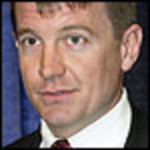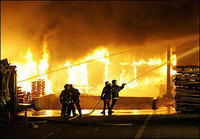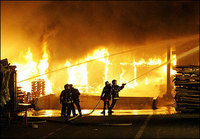The following is a work of fiction. Here is the Table of Contents, which is updated as new chapters are written.
The Duke of Oil is the third in a series of sci-fi novels of the type known as
alternate history. What’s different is that this series takes place in
our time, with characters familiar in your real life.
The first book in the series, The Chinese Century, was written late 2004. Its table of contents is here. The second, The American Diaspora, was written in 2005. The table of contents for that book is here.
A synopsis of the series is here.
“How dare you?” he demanded. “How dare you let those ragheads parade me around like a common criminal!”
Cheney let the wind die down, without letting the sneering smile leave his face. “It wasn’t that bad. Given the facts a little public embarrassment was the least we could offer.
“Besides,” he added, swiveling his chair to look upon the forest of construction cranes which defined Dubai, “the more the emirs democratize, the easier they are to manipulate. We sacrifice a little now for long-term gain later. Think of it as an investment of time.”
“Investment of time?” demanded Prince. “I’m facing a 10 year sentence. In a real live god-damned raghead jail!”
Cheney brushed that aside with a wave of his hand. “Nothing of the sort. We make some payments to the people involved, throw the kids some American scholarships, and no one testifies to anything. $10 million is petty cash, a rounding error. Remember, that attack increased the risk premium on oil by $10/barrel for two weeks. And we had our trades fully leveraged. Your share in those profits alone comes to $200 million. So relax…” he concluded. “Have a Coke.”
Prince looked down at the paper in front of him, opened it, and smiled.
—
The explosion was five miles away, but I still felt it from my bed in the Tower. It came in the form of a mild shake, a slight disturbance. This was followed, a few minutes later, by the faint sounds of sirens, and then, almost immediately, by the telephone ringing.
It was the old Always-On plant, now hard at work making Professor Wong’s fuel cells. We had hoped its location near the Airport would give it some protection. We had only made minor tweaks to the development’s own security effort.
Big mistake. My mistake.
Dr. Wong met me at the site, just a few hours later. He had been busy at his Witswaterand laboratory, working on new techniques for increasing yields and lowering costs. It was boring work, he said, and he was working hard teaching classes in hopes of finding new graduate assistants to handle that work, freeing him to do more basic materials research.
I nodded absently, looking instead at what was left of our factory. The roof where my son John had been working just a few months earlier was caved-in. There was water everywhere, and the smell of electrical smoke.
The Sun was just coming up over Africa to the East. That made it, what, about 4:20 in the morning?
“Was anyone here? Anyone see anything?”
The question wasn’t demanding an answer, but a detective in an open-neck shirt suddenly appeared at my side and answered. “No one living saw anything,” he said, pointing toward a spot near the front of the former building. “Pistol shot. Close range. Front of the head. He saw someone who didn’t want to be seen.”
“Any other evidence?”
The detective pointed toward a spot about 10 feet from where the guard’s body had been. “A very simple incendiary. What you used to call a Molotov cocktail – gasoline in a bottle with a cloth for a wick, thrown from about that point toward the cener of the space. A second tossed toward the spot where the first had been thrown, as the perpetrator left.”
“How many people?”
“No obvious evidence of more than two. But I’d say 4, as a hunch. Probably in a small pick-up, two in the cab, two more in the bed.”
“Catch them?”
A shake of the head. “No, but it’s a typical Soweto-style crew. We’ve seen it before. If anything goes wrong the car takes off. This one didn’t.” A crackling on his radio, attached to a shoulder. He leaned his head into it, nodded. “There’s a second body, near the entrance to the project. Tossed into the bushes, which is why we didn’t find it at first. A green para-military shirt, probably one of the perps. We’ll run the ID and see if we can learn more.”
I nodded. “I doubt you’ll find much,” I said. “I doubt you’ll find much if you find the others. But identify them, please. And then follow the money.”
I turned again toward Dr. Wong. “What have we lost?” I asked.
“A few weeks’ production, nothing more,” he said. He seemed unconcerned, more than ready to return to his bed.
“Look, I need to increase your security,” I said. “Whoever did this wasn’t looking to stall production. They were looking to take us out entirely. This was just a warning shot. You’re the target.”
Wong shrugged his shoulders. “If they want you, they get you,” he said fatalistically. “I’m just a scientist. Killing a scientist after his biggest discovery doesn’t change a thing. It only matters if you kill him before his biggest discovery.”
I snapped my fingers. “Dr. Wong, I know you want to get back to basic research. How about if we set up a lab for you in the Tower itself? We can even get you and your family an apartment. I’ll give you mine if necessary.
“Right now your life means a lot more than mine.”














